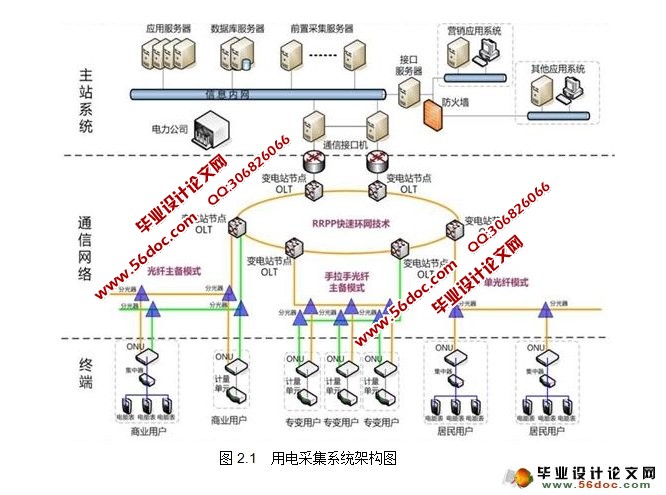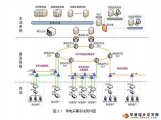用电信息采集系统的研究与应用(硕士)(论文34000字)
The research and application of electric information acquisition system
摘 要
用电信息采集系统建设是智能电网建设的重要组成部分,是“SG186”信息系统和营销计量、抄表、收费标准化建设的重要基础。用电信息采集系统实现了计量装置在线监测和用户负荷、电量、电压等重要信息的实时采集,及时、完整、准确地为“SG186工程”营销业务应用提供电力用户实时用电信息数据,为建立适应市场变化、快速反映客户需求的营销机制,从客户用电信息的源头提供数据支持,为“分时电价、阶梯电价、全面预付费”的营销业务策略的实施提供技术基础,从技术上支持了提升企业集约化、精益化和标准化管理水平的管理要求。
用电信息采集系统建设遵循“规范化、实用化、可靠性、先进性、经济性、继承与发展相结合”基本原则,实现系统数据采集、数据分析和处理、对用户开关或电表的控制、高级综合应用等功能,对各类电力用户实现“全覆盖、全采集、全预付费”。
本课题将对用电信息采集系统建设分析及采集方式介绍,重点介绍在线监测用电异常处理功能应用,对常见的异常告警种类和原理进行了分析,并对实际业务的日常流程进行描述,并且对远程抄表结算功能应用,基于用电信息采集系统远程抄表功能的应用研究,针对“集抄集收”的新型抄表收费模式可行性研究,同时利用用电信息采集系统数据,对低压线损进行准实时分析和统计。
关键词:用电信息采集系统,在线监测,集抄集收,台区线损
ABSTRACT
The construction of Electricity Information Acquirsition System is an important part of the smart grid construction, is "SG186" important foundation for information systems and marketing metering, meter reading, charging standardization construction. Electricity Information Acquirsition System to achieve a metering device on-line monitoring and user load, power, voltage, and other important information for real-time acquisition, timely, complete and accurate to provide electric power users real-time information data for "SG186 project" marketing business applications, for the establishment of adapt to market changes, rapid response to customer demand marketing mechanism, and provide data to support customer electricity from the source of information, provide the technical basis for the implementation of "TOU price ladder, fully prepaid" marketing business strategies, technically support the intensification enhance lean and standardized management level management requirements.
Electricity Information Acquirsition System construction follow the combination of "standardized, practical, reliable, advanced, economical, inheritance and development" basic principles, for system data collection, data analysis and processing, the user switch or meter control, advanced integrated applications and other functions, various types of power users to achieve "full coverage, full collection, all pre-paid".
This paper will introduce the information collection system construction analyze and acquisition mode , focusing on power-line monitoring application exception handling capabilities of the common types of abnormal alarm and principles are analyzed, and the daily flow of the actual business description, and clearing functions for remote meter reading applications, applied research information collection system based on remote meter reading capabilities for the new meter reading fee model feasibility study "set revenue", while taking advantage of the power of information data collection system, low pressure loss quasi-real-time analysis and statistics.
Keywords: electric energy data acquisition system for on-line monitoring of collecting set line loss Taiwan area.

目录
摘 要 I
ABSTRACT II
第一章 绪论 1
1.1选题背景及意义 1
1.2国内外研究及动态 1
1.2.1 国外研究及动态 1
1.2.2国内研究及动态 2
1.3课题研究内容 3
第二章 用电采集系统架构分析 5
2.1系统架构 5
2.2架构分析 6
2.2.1用电信息采集系统主站 6
2.2.2通信网络 7
2.2.3采集终端 8
2.2.4采集方案 10
第三章 新型集抄集收管理 19
3.1 用电信息采集系统抄核收的应用 19
3.2传统抄收管理的弊端 19
3.3新型集抄集收管理模式的探索 20
3.3.1集中抄表模式的探索 20
3.4新型抄核收模式的效益分析 23
3.5本章小结 23
第四章 用电采集系统在线监测 25
4.1在线监测功能简介 25
4.2在线监测异常情况分析 25
4.2.1 计量设备异常 26
4.2.2 用户用电异常 29
4.2.3 终端运行异常 31
4.2.4 电网运行异常 33
4.3传统终端典型故障分析及处理 34
4.3.1 维护常使用的仪器 34
4.3.2、通信类故障检修 36
4.3.3 常见采集终端典型故障处理 37
4.4 本章小结 40
第五章 线损管理功能的分析及运用 41
5.1台区线损的有关知识 41
5.1.1台区线损概念 41
5.1.2台区线损的分类 41
5.1.3台区线损的影响因素 42
5.1.4加强台区线损管控的措施 43
5.2 台区线损管理总体架构设计 44
5.2.1设计原则 44
5.2.2 架构设计 45
5.3 业务流程设计 46
5.3.1台区线损基础信息管理业务流程 46
5.3.2考核单元管理 46
5.3.3考核电量管理 47
5.3.4线损统计 50
5.3.5线损异常管理 51
5.4台区线损实例分析 52
5.4.1用电采集系统分析 53
5.4.2现场核实 53
5.4.3稽查结论 54
5.4.4整改情况 54
5.5本章小结 55
第六章 结论与展望 56
6.1结论 56
6.2展望 56
参考文献 58
致 谢 63
|



